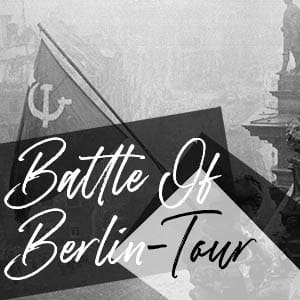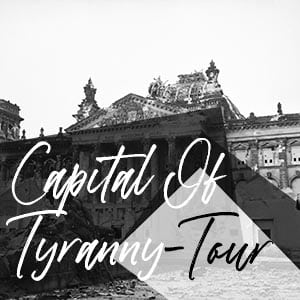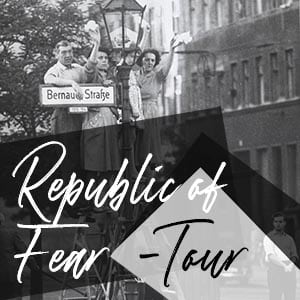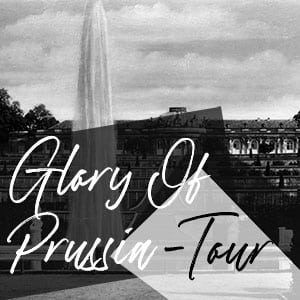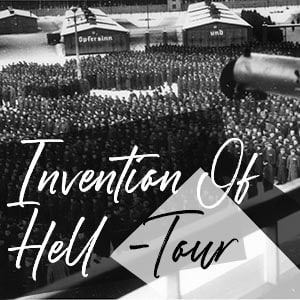Q: Who is Matt Robinson?
I have spent more than a third of my life in Berlin but I’m originally from the north of England – a town in Yorkshire called Pontefract, famous mainly for its liquorice and now ruined castle where King Richard II was imprisoned and mysteriously died.
I arrived in Berlin on my way to the Balkans, after completing a Bachelor’s Degree in Journalism. I decided to ‘pass through’ the city to see what was going on for myself, with no intention of spending any longer duration of time here.
Moving to Berlin though was undoubtedly one of the greatest decisions of my life. I found not only a city I felt I wanted to live in but also a country admirably dealing with its troubled history in a way that remains both confronting and fascinating.
Q: What inspired you to become a guide?
I’ve always considered tour guiding in Berlin to be journalism by another name; the story-telling, the presentation, the editorial process, the performance – the pursuit of the truth. Naturally, one can’t be a good journalist without being a good historian – and somewhere between those two things (with a touch of dramatic flair) is where the exceptional tour guide can be found. A gatekeeper in the pursuit of ideas.
I have never been interested in fridge magnet tourism – ticking boxes on a long list of must-see sights. Guiding in Berlin goes beyond that. Tourism may well be the arena but education is the real intention. To dispel myths. Counter ignorance. I’ve discovered that in the context of guiding – where dialogue is paramount – these things are more easily realised than with other mediums.
After more than a decade of working as a private guide in Berlin for numerous different companies and clients, I founded Berlin Experiences as a way to channel and share my years of ongoing research here – offering private guided tours to people who are equally curious. I try to split my time between guiding, developing Berlin Experiences and helping run the Berlin Guides Association as the current President. Somewhere in between all of that I sometimes have time to write; which may be the fundamental connection between all three things.
Q: Have many tours have you led?
Somewhere in the thousands.
Q: Which tours do you specialise in?
Beyond the Classic tours – Berlin Highlights, Cold War, Third Reich, Jewish Heritage tours – I also offer tours of nearby Potsdam and the Sachsenhausen Concentration Camp Memorial. In 2018, I commemorated the anniversary of the construction of the Berlin Wall by cycling around the entire 160 km stretch of Mauerweg (the former path of the Wall) with the Berlin Guides Association. I now offer cycling tours of the city and areas around – including a Berlin Wall ride that I think is quite unique. There are certain tours which I understand I don’t have the expertise to lead, such as the Craft Beer and Street Art tour, although fortunately I work with some truly exceptional guides who are experts I trust 100% with these things.
Q: Can you recall a particularly memorable experience from your tours?
I often get asked by clients whether constantly talking about the same topics gets exhausting or whether the weight of German history gets too much. After much contemplation I realised that the act of sharing these stories and seeing the reactions of people I meet is one of the core reasons I love this work. In a sense, every time is the first time when it’s the first time for someone else. To see revelation at work is an awe inspiring thing; that powerful moment where the pieces come together for someone and there is a click of understanding. Clarity. Rather than one particular memorable experience, I would say that is an overall experience that I keep returning to, with the help of the people I meet.
Q: If you were to visit Berlin again for the first time what three things would you want to experience again for the first time?
When I first arrived in Berlin, the city was a little different to how it is now – in essence the same, with the same rawness to it – but darker; perhaps best explained as closer to the source of its anguish. It is often said that Berlin is incomplete – or in the process of being defined – doomed to be eternally unfinished. I’ve seen the city refine itself in many ways since I arrived – largely for the best. But that has swept away some of the intensity that Berlin has since become known for – and many still arrive to seek out.
The Berlin techno scene I found fascinating when I arrived, it reminded me of the UK anarcho-punk scene I grew up admiring in my teens. The complete disregard for a mandate for expression. The DIY ethic. The minimal, industrial sound, the reappropriation of spaces – bomb-damaged buildings, power stations – but overall, the Alice In Wonderland sense of exploration that came with it. All that died with Google Maps. The scene has no doubt moved on. To revisit that would be impossible now, no matter how many other people are searching for it.
To say Berlin’s citizens are a politically active bunch would be an immense understatement. The tendency for grassroots activism has always been there. However, with the country’s current climate of commemoration, where there were once citizens’ initiatives there are now numerous government supported projects. Two of my favourites examples would be the Topography of Terror museum and the Stasi Museum (housed in the former headquarters of the East German secret police). Both were much less co-ordinated (or less polished) when I first visited them, it was obvious how much attention and pride in dealing with the history had been taken when introducing these projects by the citizen caretakers. With government funding both of these places are now more accessible to the general public; but I can’t help but feel some sense of nostalgia for the handwritten and photocopied dedication to preserving and presenting history that existed when the two locations were volunteer-run and driven by a passionate belief in the preservation of history. Many of the staff still working at the Stasi Museum have personal stories of their experiences interacting with the East German secret police, as victims of that oppressive organ, and the time I have spent working alongside them has gifted me a sense of humility and respect in light of their diligence and dedication. Although I continue to be impressed by the official way of dealing with history in this country, there is something about making history official that takes it a step away from the reality – and the people who experienced it.
Lastly, I would say the third thing I would like to experience again would be a certain Döner kebab stand that I ate at (that no longer exists). Everyone has that place that they recall visiting that managed to elevate something conventional to mythical status. The tomatoes that tasted unbelievably divine, the bread that was softer and more satisfying than any other bread you can recall. In a city of Döner kebab stands, I have never been able to find anything that stands up to the original experience I had my first time in the city. Although I know lots of places that come close and are exceptional in their own right. Nothing tastes like that first late night Döner when it’s done right.
Q: Do you have a particular book or movie about Berlin that you like to recommend to clients? Why?
I have found it fascinating in my time in the city how the fictional character of Berlin has changed. Since German reunification there has been a renewed attempt through film and television to spotlight the city, and the country, and show its true face (wrinkles and all). To define, or perhaps better redefine, what Berlin means. That has been most evident in films like The Lives of Others and Goodbye Lenin, attempting to present aspects of the East German story in a format that can be understood in the aftermath of German reunification. Similarly there is the Baader Meinhof Komplex, that deals with the terrorist group in 1960/70s West Germany, even Berlin Calling and Victoria – which is a true masterpiece in film, shot in one take – both with Berlin’s legendary nightlife scene in a starring role. More recently I’ve taken to recommending the TV series Deutschland ‘83, which deals with Cold War espionage in East and West Germany. No doubt one of the major movies that frequently resurfaces in recommendations is The Downfall, detailing the last days of life in Hitler’s bunker. I’m uncertain whether it would be best to see these movies before experiencing Berlin or after to reassess the city. But their impact and relevance is undeniable. As for literature, that would be an even longer answer that I’ll save for another time.
Q: What advice would you give a new guide?
Give 150%. And then tone it down to what feels natural.
Speak louder than think you need to speak to be heard. Learn more than you think you might need to learn. Always carry water. And be friendly to the people you see while out on the street, whether they are other guides or the person cleaning the toilet, because you will see them again.
Q: What’s the quintessential Berlin souvenir?
The sense that things can be different.
Our Related Private Tours
Learn more about the Battle of Berlin and explore this urban battlefield with our Battle of Berlin tours.
Learn more about the history of Nazi Germany and life in Hitler’s Third Reich with our Capital Of Tyranny tours.
Learn more about the history of East German and life behind the Iron Curtain with our Republic Of Fear tours.
Learn more about the history of Prussia and the life of Frederick the Great with our Glory Of Prussia tours.
Learn more about SS ‘Protective Custoday’ on our Sachsenhausen Concentration Camp Memorial tours.

